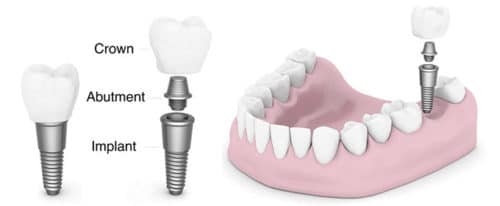Missing or extremely damaged teeth can have a significant impact on your overall appearance as well as severely affect the functionality of your teeth. It can make chewing difficult, which can have negative effects on digestion. Missing teeth or loose teeth also cause the remaining teeth to shift and increase your risk of developing an oral infection, which has the potential to spread to other parts of the body via your bloodstream. They also may interfere with speech and have been known to be the cause of headache pain. Fortunately, the average modern patient has far better options than their counterparts of the past. Dentures used to be the only solution to these issues, but modern technology has made implants a more viable alternative for many people. Here’s what you need to know about dental implants:
Implants Offer Superior Functionality
Because they’re attached via titanium posts that are fused to the bone, dental implants mimic the functionality of real teeth. Unlike dentures, there is no risk of them slipping while you’re eating or talking, and you don’t have to take them out at night. They’re also extremely durable and can last as long as 40 years if you provide them with the proper care. They also look and feel more natural than dentures.
Implants Can Be Customized
Your dentist can fit you with a single implant if you only have one missing tooth or with multiple implants if you’ve got several missing teeth. You can also be fitted with an implant design called an arch if you have several missing teeth in a row.
Implants Have Three Parts
There are three parts to the standard dental implant. They include the following:
- The root — this is a titanium fixture that is implanted into the bone tissue of the jaw to perform the function of a natural tooth root.
- The abutment — also made of titanium, this connects the root to the prosthetic tooth.
- The crown — the prosthetic tooth that’s designed to look, feel, and function in a way as closely as possible to its natural counterpart.
Titanium is used for the roots and abutments because of its high degree of biocompatibility with bone tissue. Crowns are usually made from porcelain, composite resins, or ceramic materials.
The Implant Procedure
The implant procedure involves several distinct steps. After determining that you’re a good candidate for implants, your dentist will prepare the implant site after administering local anesthesia to the area. Most patients report feeling only a minimal amount of discomfort during this procedure. Your dentist may advise an over-the-counter pain reliever for the first day or so after the anesthesia wears off.
The titanium implant will bond with your bone tissue over the course of the next few months. If the implant is situated in a highly visible part of your mouth, your dentist may install a temporary crown. After the titanium root is sufficiently bonded, your dentist will uncover the implant root and contour the surrounding gum tissue for optimal functionality and appearance.
After the healing and bonding process is complete, your dentist will create an impression to be sent to a dental lab so that technicians can make your permanent crown. On your final visit, your new crown or crowns will be fused to the abutment.
Caring for Your New Implants
It’s important to use a low-abrasive toothpaste and a soft-bristled brush to clean your new implants in order to prevent scratching their surface. It’s also important to floss them on a regular basis and to see your dentist every six months for professional cleaning sessions. Using an antibacterial mouthwash after brushing and flossing will help prevent gum disease. Those with implants should avoid chewing on objects such as pencils and hard candy. Your dentist will give you a list of best practices for after your implants are installed.
Dr. Benjamin Metz has been practicing dentistry since he graduated with a doctorate in surgical dentistry from Case Western Reserve University in 1987. Please call us for an appointment or schedule one through our contact form for more information on how implants can increase your dental health and elevate your overall quality of life.


